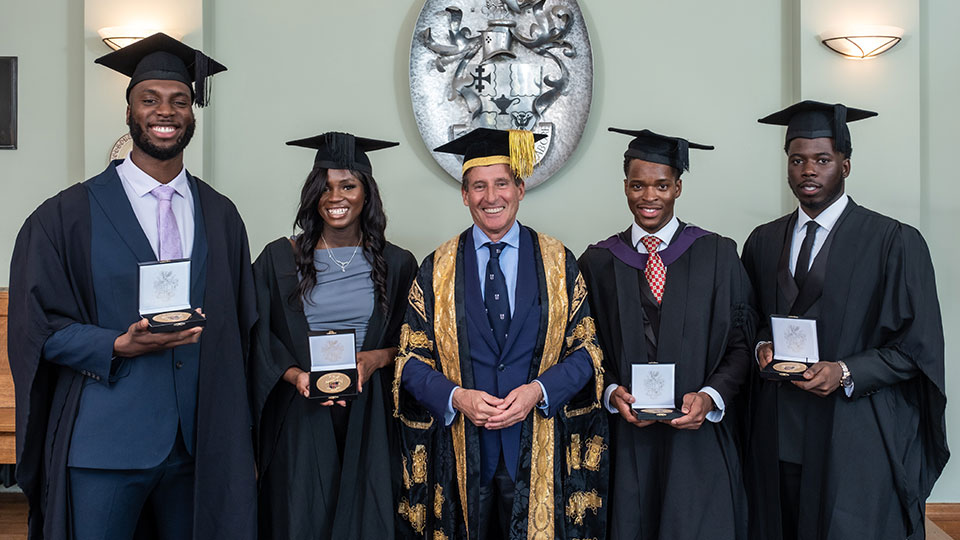Ladi Ogunmekan, Samuel Ola, Faith Oluwaremi and Emmanual Shittu were the four students at Loughborough who pioneered the Black in Sport Summit (BISS), an event launched last year to drive positive change within the sport industry.
Frustrated by the discrimination Black sportspeople face – particularly so after the England Men’s football team lost to Italy at the UEFA 2020 Championship Final – the students set out to change the narrative. They wanted to share positive stories and celebrate the achievements of Black athletes, coaches and managers, as well as raise awareness of the challenges in the industry, such as racial inequality, underrepresentation and discrimination.
After a successful first event held in partnership with the University and Loughborough Sport, media giant Sky pledged its sponsorship for the 2023 event themed around ‘Excellence, Leverage, and Influence’ which doubled the number of speakers in attendance, featuring the likes of Team GB swimmer Alice Dearing and Formula One’s Sir Lewis Hamilton.
By bringing together established sport leaders and forging strategic partnerships with community groups and major multinational organisations, in just two years the Black in Sport Summit has established itself as a transformative platform for a more inclusive and representative sports landscape.

In early 2020, the world came to a standstill as the Covid-19 pandemic changed lives overnight, with social distancing, isolation and household bubbles becoming the norm. Universities were faced with multiple challenges on how to keep their communities safe as we slowly returned back to normality.
Professor Neil Budworth, the University’s Director of Health, Safety and Wellbeing, played a central part at every stage of the University’s response. His incredible knowledge, skill and dedication to ensuring Loughborough University was a safe place for students and staff to live, work and study was noted across our community. Neil regularly advised on the implications of the emerging Government and NHS guidance across the two years of the pandemic, and he developed the social distancing measures across campus, as well as leading the establishment of the Covid-19 testing processes at Loughborough, which saw over 90% of staff and students regularly taking lateral flow tests on site – the most extensive testing regime of any UK university.
Neil often represented the country’s higher education institutions at meetings with Public Health England and the Department for Education to help shape national policies around areas like face-to-face teaching and ventilated spaces. Furthermore, the impact of his work influenced the World Health Organisation’s thinking on education and Covid-19.

Julie Turner, the University’s Strategic Scientific Technical Lead, is described as having ‘a positive, uplifting approach to everything she does, even when facing her own personal challenges. Colleagues have applauded her for her kindness, compassion, professionalism and dedication to work.
Like Neil, Julie was known as a ‘mastermind’ behind the extensive on-site Covid testing programme at Loughborough. She worked tirelessly with a dedicated team month after month to support the University’s journey back to post-pandemic normality.
As a result, our students were able to attend more in-person classes, play sport, and also graduate at one of 50 socially distanced, in-person graduation ceremonies held in the summer of 2021.
She also spearheaded the on-site PCR test facility, and provided international students with information about the tests they needed to take both before and after travel.
Julie was also recognised for the day-to-day role she plays in the health, safety and wellbeing team, as well as being an advocate for the University’s technicians, whose innovation and technical wizardry bring staff and student projects to life.

Since Covid-19, society has been battling with another hard-hitting public health issue – the Cost-of-Living crisis. Loughborough University’s Centre for Research in Social Policy seeks to research and influence policies around poverty, living standards and income adequacy.
Professor Donald Hirsch, who joined the Centre in 2008 before becoming its Director in 2012, became responsible for coordinating the research that defined the Minimum Income Standard, which has helped to make a positive financial difference to the lives of millions around the world.
The Minimum Income Standard sets out the amount of regular income that different types of households need to have an acceptable standard of living.It’s based on the views of the public – from parents to pensioners – who say which goods and services they consider to be essential.
Since 2011, the research has become the bedrock for calculating the Real Living Wage, the only UK wage rate based on the cost of living, which is voluntarily paid by more 12,000 businesses in the UK. Charities have also used the Minimum Income Standard to decide who needs their support the most.Further afield, the Minimum Income Standard has been adopted in several countries, with France, Portugal, Japan and Mexico just some of those using it to inform their own social policies.
Professor Hirsch is also a member of the UK’s ‘Homes for Ukraine’ scheme, having opened up his family home to two of those forced to flee Ukraine due to the ongoing conflict in their home nation.
Donald’s research, work and personal commitments are testament to his unwavering dedication to social justice and equality. Throughout his career, he has provided us with a deeper understanding of the challenges faced by low-income households and has laid the groundwork for national and international policy interventions that are making a tangible difference to people’s lives.
Congratulations to all this year’s University Medallists.
